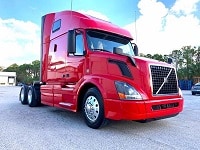
Regional truck driving is when a truck driver will have a route in a distinct area of the country or region. For example, if a truck driver will be driving in the Southeast region of the country, the driver will probably be driving in Georgia, Florida, Alabama, Arkansas and Tennessee. A regional truck driver will have a predetermined run or route that will have the driver to be home once or twice during the week, and usually always home on the weekend.
What is the Difference Between Regional and Local Truck Driving?
There are many differences between regional and local truck driving.
Let me tell you about some of them. Honestly though, if you want to learn more about local driving you need to check out this article I wrote.
Local truck driving is where the truck driver will be driving closer to their home while regional drivers will go into surrounding states.
Usually, the truck driver will have a route that will keep them driving in their state or a neighboring state.
A local truck driver will usually drive within 200 miles from their home.
Local drivers have several stops on their daily route, and the driver may be required to load and unload the freight at each of the stops.
A local truck driver will earn less money than a regional truck driver, because the regional truck driver is usually paid per-mile while the local trucking job is paid by the hour.
A local truck driver will do their route in one day, then they can go home while a regional truck driver may be away from home doing their route that may take a few days to complete.
When a regional truck driver arrives to their destination, they usually don’t have to unload any freight.
A local truck driver does more manual labor than a regional truck driver, because the regional truck driver drives a longer distance to get to their destination.

Regional Truck Driver’s Schedule
A regional truck driver’s schedule will usually be the same each day as they usually have a regular route.
They can get to know their route quickly and will be able to find the best efficient route along with learning the best places to stop for breaks or a safe place to stop for the night.
A regional truck driver’s job is more than likely to be hauling freight to warehouses, factories, or hauling mail.
Most regional truck drivers will use a dry trailer and they usually need to drop and hook, which means they will drop their trailer at the destination, then hook up to another trailer to return back home.
A regional truck driver will usually have every weekend off, and sometimes they are able to come home during the week too.
This is a huge reason why drivers decide to go regional, the home time is awesome!
Usually, a regional driver will drive during the day, which many drivers prefer, especially when the weather is bad.
Regional Truck Driver’s Home Time
Home time is a very important benefit with any truck driver.
A regional truck driving job is an excellent choice for many drivers, because they are usually home most weekends and on some nights during the week too.
A regional truck driving job will have the driver covering approximately 1,000 miles, which provides the driver with the home time that they want and need.
If you are planning to start a family then regional truck drivers is a great way to go because you won’t be gone for weeks at a time.
Regional Truck Driving Pros
Regional truck driving has many pros and benefits, which include
1.Plenty of Home Time
A regional truck deriver will have plenty of home time.
A regional truck driver’s route or run is usually around 1,000 miles maximum.
The driver will be driving in the region where they live, so they are able to be home more often.
2. Pay is Higher
A regional trucking job will usually pay the driver by the mile, which is more than working by the hour.
A regional trucking job’s compensation can start off at $55,000 to $65,000 per year.
A nice salary indeed!
3. Not Physically Demanding
A regional truck driving job isn’t usually physically demanding, because regional routes will have someone at the destination (warehouse or factory) to unload the freight once the driver has arrived at their destination.
Many regional jobs are drop and hook, which means the when the driver arrives to their destination, they will drop the trailer with freight there, then hook up to an empty trailer or one that has been already loaded with freight, so the driver has a quick turn around with their route.
4. Solo Driver
A regional trucking driving jobs usually want to hire a solo driver, which means you don’t have to work with another driver.
It is very rare for a company to use team drivers, so if you prefer to drive alone, then regional truck driving is the right choice for you.
5. Set Schedule
Regional trucking jobs will usually have the same schedule and route.
With having the same route, the driver will be able to get to know the route, roads, and highways better, so they will be able to figure out the best route available.
The driver will also get to know the workers at their destinations, which makes the job easier.
Regional Truck Driving Cons
As with any job, there are cons and downsides. The regional truck driving cons include:
1. Tight Schedule
A regional truck driver will have a tighter schedule than a local truck driver.
They often have to drive long hours to make sure they meet their schedule and appointments.
Local drivers have a more relaxed schedule where they work at their own pace.
2. Spend Nights in the Truck
A regional truck driver will have to spend a night or two in their truck or in a hotel (depending on the company) because they usually have to drive up to 1,000 miles.
This is not as bad as OTR drivers that are spending every night on the road away from home.
3. Same Day Delivery and Pickup
Another con of regional truck driving is a regional truck driver will have a delivery scheduled on a set day and time, then the driver may have to go pickup another load to head back with on the same day as well.
This means the driver may have to wait to get loaded, and usually the driver will not be paid for waiting for the trailer to get loaded.
Honestly though, waiting to get loaded is common to all types of truckers.
4. Boredom
Another con of regional truck driving is boredom.
The driver will have the same route and run with could cause the driver to become bored with the same scenery.
For a lot of drivers they are willing to put up with a little boredom in order to spend more time at home.
Regional Truck Driving Experience
Are you already a driver and you are interested in knowing what experience you need to be a regional truck driver?
Most companies require a truck driver to have a CDL (Commercial Driver’s License), and to have a clean driving record.
Most companies also require the driver to be twenty-one years old along with having two to three years of OTR (Over the Road) driving experience.
Is Regional Truck Driving Right For You?
Regional truck driving comes with many benefits and perks for truck drivers.
It’s is an excellent choice if you want to be home on weekends and sometimes during the week.
This is perfect for drivers that have a family.
The driver doesn’t have to drive too far from home, but still get drive plenty of miles to make sure they make a decent paycheck.
Regional truck drivers will usually have a set route and schedule, which will make it easier for the driver, because the driver is able to plan ahead.
A regional truck driving job usually prefers solo drivers, which is perfect for drivers who prefer to drive alone.
If you are ready to start looking for a regional truck driving job, them make sure you read the reviews on the company you are applying to.
You can also ask other drivers about their company.
If the company has a big turnover, then that company may not be the one you want to work for.